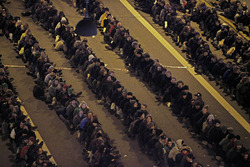Protests in Copenhagen: Rights groups press for inquiry into police tactics
Denmark may be breaching European law, Danish human rights groups claimed tonight as they called for their government to launch an immediate inquiry after police in Copenhagen used controversial kettling and mass preventative arrest tactics for the third day running.
Following the arrest of 68 people on Friday, and 958 yesterday on Saturday, police today arrested 257 demonstrators, “kettling” a section of a march near Osterport station, and as they had done on Saturday, cuffed the protesters and put them onto buses transporting them to a detention centre.

As the COP15 climate change summit in Copenhagen carries on into its second week, accounts were emerging of the treatment of the detainees on Saturday night – 945 of them had been released by this morning, with just 13 remaining in custody.
Maria Ludwig, 22, one of the detainees released, had arrived in Copenhagen from Germany on Friday, said: “They kept me for two hours with plastic cuffs around our wrists and our hands behind our back, and then they put us on the bus. We had nothing to eat or drink, and one man asked the police to go to the toilet and they said: ‘No way are you going to put your trousers down, you’ll just have to piss into your trousers.’”
Another protester from Germany, Chris, who asked not to give his surname, described the way that the detainees were made to sit: “With our legs on either side of the people in front of us, and then leaning on the person behind us, with our hands still cuffed behind our backs. It was very painful for the person behind you and you were in pain from the person in front of you. It looks like Guantánamo when you see it.”
He described being kept in cages, constructed by police for holding detainees: “You have a cold solid floor and four mesh walls and a mesh ceiling, and outside cops walking around with dogs.”
Humphrey Lloyd, 24, a protester from the UK, was held for six hours: “The whole thing is such an abuse of our right to peaceful assembly. This was so obviously the fluffier part of the march.”
Campaign groups, NGOs and human rights groups in Denmark and in Britain condemned the actions of the police. In the UK the use of kettling became controversial at the G20 protests this April.
Claus Bonnez, a lawyer working with Krim, a human rights and legal support organisation, said: “This has all been done under the fairly new law which entitles police to arrest people and keep them for up to 12 hours. But according to the European Court of Human Rights process, the police will have to prove that it is necessary for democratic society to make such arrests. And I don’t think that the Danish police will be able to prove that.”
Ida Thuesen, of Amnesty International Denmark said: “We call for the government ombudsman to begin an immediate investigation into the arrests last night. When nearly 1,000 people are arrested and then all but 13 are released it means that many of those people were just innocent people in the wrong place at the wrong time.”
Deborah Doane, director of World Development Movement said: “It’s absolutely outrageous that the police responded in this extreme manner on an incredibly family-friendly march. It’s a complete violation of the right to protest and a step towards the breakdown of democracy. This is the most crucial issue of our time and the people must be heard, not criminalised.”
Activists intend to continue with their demonstrations this week.
Source: http://www.guardian.co.uk/environment/2009/dec/13/copenhagen-protests-police-tactics



